Shingle Street
| Shingle Street | |
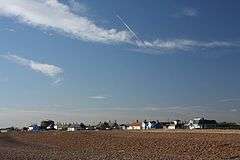 Shingle Street in January 2008. |
|
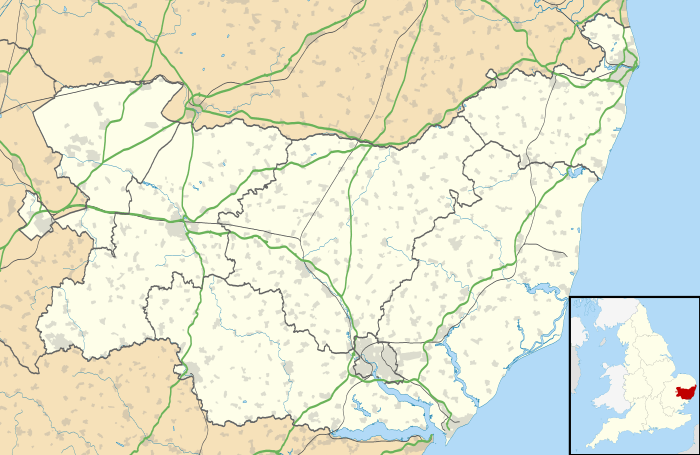 Shingle Street |
|
| Shire county | Suffolk |
|---|---|
| Region | East |
| Country | England |
| Sovereign state | United Kingdom |
| Police | Suffolk |
| Fire | Suffolk |
| Ambulance | East of England |
| EU Parliament | East of England |
Coordinates: 52°01′55″N 1°27′00″E / 52.032°N 1.45°E
Shingle Street is a small coastal hamlet in Suffolk, England, at the mouth of Orford Ness, situated between Orford and Bawdsey. Part of the coast is also known as Hollesley Bay; HM Young Offender Institution, Hollesley Bay Colony, is nearby.
Shingle Street was originally a home for fishermen and river pilots for the River Ore. Early in the 19th century a Martello tower was built, which was later a home for coastguards. Many of the original buildings date from this period, also several buildings were destroyed during World War II, including the Lifeboat Inn, the hamlet's only pub. A report from October 2004 suggests that Shingle Street is at risk from the sea and could disappear within 20 years if sea defences are not erected.[1]
Shingle Street was the inspiration of the Thomas Dolby song "Cloudburst at Shingle Street", from the album The Golden Age of Wireless.
World War II
After World War II many strange happenings were reported to have taken place at Shingle Street, including a failed German invasion.[2][3][4] Since the civilian population had been evacuated in May 1940, there were no eyewitness reports, although official documents remained classified until questions in the House of Commons led to their early release in 1993.[5] These papers disclosed no German landing. In fact rumours of a failed invasion on the South and East Coasts were commonplace in September 1940 and helped to boost morale. Author James Hayward has proposed that these rumours, which were widely reported in the American press, were a successful example of black propaganda with an aim of ensuring American co-operation and securing lend lease resources by showing that the United Kingdom was capable of successfully resisting the German Army.[6]
- Views of Shingle Street
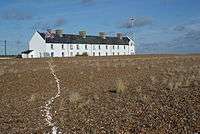 Coastguard cottages, Shingle Street
Coastguard cottages, Shingle Street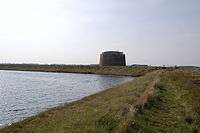 The Martello tower
The Martello tower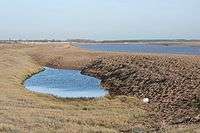 Percolation lagoon at Shingle Street
Percolation lagoon at Shingle Street
References
- ↑ "Shingle Street".
- ↑ Hayward, James (2001-05-28). The Bodies on the Beach: Sealion, Shingle Street and the Burning Sea Myth of 1940. CD41 Publishing. p. 18. ISBN 0-9540549-0-3.
- ↑ "1940: The Secret War at Shingle Street". Ronald Ashford. 2007-11-07. Retrieved 2007-09-23.
- ↑ Hayward, James (2002-10-02). "The Bodies on the Beach". BBC News. Retrieved 2007-09-23.
- ↑ Hansard Debates. House of Commons. 1993-02-19.
- ↑ Hayward, James (2002). Shingle Street. CD41 Publishing. ISBN 0-9540549-1-1.
Further reading
- Johnson, Derek E (1992). East Anglia at War 1939-1945. Jarrold Publishing. ISBN 978-0-7117-0598-2.
External links
-
 Media related to Shingle Street at Wikimedia Commons
Media related to Shingle Street at Wikimedia Commons